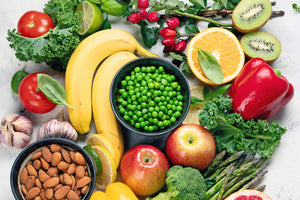Written By  Go Vita
Go Vita
blog
Unlocking The Benefits Of Plant Protein

Climate Change Impact
A Plant Based Alternative
Proganics Plant Protein Plus
Must-Try Recipes
Chocolate Peanut Butter Protein Smoothie


Salted Caramel Protein Oats
Unlocking The Benefits Of Plant Protein
Adding plant-derived protein foods and supplements to your diet is good for you, and also good for the planet.
Did you know that, in 2023, we witnessed the warmest year since temperature recordings commenced in 1850? As our global population approaches 10 billion people, the need to address climate change and make better environmental choices is increasingly important.
Many of us are already taking steps in the right direction, such as reducing reliance on single-use plastics and opting for more sustainable and renewable sources of energy and transportation.
However, there is another key aspect of everyday life where small changes can have a significant impact on the environment: our diet.
Climate Change Impact
While traditional animal-derived protein products, such as whey and collagen, have long been used as healthful and beneficial sources of dietary protein, there is also the view that farming cattle—which provide whey and collagen—can contribute to greenhouse gas emissions.
Many farmers do take a highly responsible and passionate approach to the eco-friendly farming of cattle, and the certification processes employed to ensure clean and sustainable production are undoubtedly exhaustive. However, that cannot necessarily be said to be true of all cattle farming around the world, especially that conducted on a mass scale. For example, the conventional fertilisers used for growing feed for livestock emit nitrous oxide, a potent greenhouse gas.
Deforestation and land-clearing for farmland release substantial amounts of carbon dioxide into the atmosphere—and the United Nations predicts global population growth and need for food production could increase demand for up to 70 percent more land-clearing by 2050.
A Plant Based Alternative
By way of contrast, plant proteins require significantly less land, energy, and water to farm than animal-derived proteins do. Plant-based proteins, such as pea protein, therefore, offer a more sustainable alternative, because they produce only a fraction of the greenhouse gas emissions.
For example, producing 100 grams of pea protein is estimated to result in the emission of only 0.9 kilograms of greenhouse gases—which is a 97.5 percent reduction from the emissions resulting from the production of cattle-derived protein. As a bonus, pea crops actually draw nitrogen from the air, which also helps to eliminate the need for additional greenhouse gas-emitting fertilisers.
Adopting a plant-based diet can not only benefit your health, it can also play a role in supporting the environment and even in mitigating climate change. Animal proteins remain essential in regions around the world that need to prioritise food security and nutrition. However, most of us can embrace plant-based options with minimal impact on our daily life—it is a gentle approach that does not require a complete dietary overhaul, just easy and mindful substitutions.
Simple changes like swapping out animal-derived protein for plant protein align not only with the global trend towards health-conscious eating, but also yield substantial dividends in our shared goal to foster a greener, more sustainable future.
Proganics Plant Protein Plus
This Australian-made and owned product utilises organic sprouted and fermented pea protein, providing a more sustainable choice.
Each shake supplies organically-derived iron (over 50 percent of your daily needs), zinc (100 percent), and vitamin B12 (100 percent), while also providing a great source of protein and amino acids. Each shake contains additional digestive enzymes and probiotics, which are included to ensure the protein is easily digested and gentle on the tummy.
Whether you blend it into your morning smoothie for a protein kick, sip it as a snack between meals to keep you feeling full, or use it creatively in healthy recipes, Proganics Plant Protein Plus is a Go Vita favourite. References available on request.
Must-Try Recipes
Looking for easy and delicious ways to amp up the plant protein content of your diet? These two promise to be firm favourites on regular rotation in your kitchen.
Chocolate Peanut Butter Protein Smoothie
Ingredients
1 scoop Proganics Chocolate Peanut Protein Powder
1 banana, peeled and chopped
1 tablespoon natural peanut butter
1 cup almond milk
Ice cubes
Method
Blend all ingredients until smooth. Enjoy after your workout for a refreshing muscle recovery boost.
Salted Caramel Protein Oats
Ingredients
1 scoop Proganics Salted Caramel Protein Powder
½ cup rolled oats
1 cup almond milk
Pinch of salt
Toppings: sliced banana, chopped nuts, a drizzle of honey
Method
Cook oats with almond milk and a pinch of salt. When oats are ready, stir in the protein powder. Top with banana, nuts, and honey.
Information presented is for information purposes only and is not intended to replace advice or treatment from qualified healthcare professionals. The information is not intended to treat or diagnose. Always consult your healthcare professional before taking nutritional or herbal supplements. If you are pregnant, breastfeeding, have any allergies or diagnosed conditions, or are taking prescription medications, always consult your healthcare professional before taking nutritional or herbal supplements.
Binge Read on these

Power Up Your Immunity: The Essential Role of Vitamin C

Anzac Biscuits Recipe: Made with Organic Ingredients

Mother's Day Gift Ideas

What are you doing to support your immune health?

Power Up Your Immunity: The Essential Role of Vitamin C

Anzac Biscuits Recipe: Made with Organic Ingredients

Mother's Day Gift Ideas

What are you doing to support your immune health?

